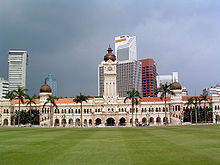- Law of Malaysia
-
The law of Malaysia is mainly based on the common law legal system. This was a direct result of the colonization of Malaya, Sarawak, and North Borneo by Britain between the early 19th century to 1960s. The supreme law of the land—the Constitution of Malaysia—sets out the legal framework and rights of Malaysian citizens. Federal laws enacted by the Parliament of Malaysia apply throughout the country. There are also state laws enacted by the State Legislative Assemblies which applies in the particular state. The constitution of Malaysia also provides for a unique dual justice system—the secular laws (criminal and civil) and sharia laws.
Contents
History
Main article: Malaysian legal historyPrior to the independence in 1957, most of the laws of United Kingdom were imported and either made into local legislation or simply applied as case laws. Malaysian law is also based on other jurisdictions namely Australia and India. The criminal law in Malaysia—the Criminal Procedure Code—was based on the Indian criminal code. Similarly, the Contracts Act is based on the Indian model. Malaysian land law is based on the Australian Torrens system.
The Federal Constitution is the supreme law of the land. It provides the legal framework for the laws, legislation, courts, and other administrative aspects of the law. It also defines the government and monarch, and their powers, as well as the rights of the citizens.
Dual justice system
The dual system of law is provided in Article 121(1A) of the Constitution of Malaysia. Article 3 also provides that Islamic law is a state law matter with the exception for the Federal Territories of Malaysia.[1] Islamic law refers to the sharia law, and in Malaysia it is known and spelled as syariah. The court is known as the Syariah Court. Looking at the Malaysian legal system as a whole, sharia law plays a relatively small role in defining the laws on the country. It only applies to Muslims. With regards to civil law, the Syariah courts has jurisdiction in personal law matters, for example marriage, inheritance, and apostasy. In some states there are sharia criminal laws, for example there is the Kelantan Syariah Criminal Code Enactment 1993. Their jurisdiction is however limited to imposing fines for an amount not more than RM 3000, and imprisonment to not more than 6 months.[2] In August 2007, the then Chief Justice of Malaysia proposed to replace the current common law application in Malaysia with sharia law.[3]
As an example of the dual system, sometimes a nightclub is raided, and Muslim patrons drinking alcohol are prosecuted in Shariah courts, while the others are allowed to drink. Also the nightclub operator is not charged with any offense, because he is not legally required to check if customers are Muslim before serving them.
Complications
Complications have arisen with regard to the dual justice system, for example with regard to freedom of religion. Article 11 of the Constitution provides that "Every person has the right to profess and practice his religion". However in the case of Lina Joy—a Malay who converted to Christianity—the Federal Court of Malaysia refused to allow her to change her religion indicated in her identity card (MyKad). The judges held that they had no jurisdiction on the matter—that it was a matter of the Syariah Court, as indicated in Article 121(1A) of the Constitution.
See also: Status of religious freedom in MalaysiaFederal law and state law
Federal laws are made by legislators (members of Parliament and senators) sitting in the Parliament of Malaysia and applies nationwide. Federal laws are known as Acts (of Parliament). State laws are made by assemblymen sitting in the State Legislative Assembly (Dewan Undangan Negeri) and only applies in the particular state. State laws are often referred to as enactments or ordinances. Article 75 of the Constitution states that a federal law shall prevail over any inconsistent state laws, including sharia laws.
Sabah and Sarawak
After the formation of Malaysia in 1963, the Federal Constitution was amended to include special provisions applicable to the states of Sabah and Sarawak. Some federal Acts of Parliament apply differently to these states on a number of matters such as Acts related to immigration, land and natural resource management. For example, in the Peninsular, the National Land Code governs most of the laws relating to land. In Sabah, the main legislation is the Sabah Land Ordinance; and in Sarawak, the Sarawak Land Code
Common law
The laws of Malaysia can be divided into two types of laws—written law and unwritten law. Written laws are laws which have been enacted in the constitution or in legislations. Unwritten laws are laws which are not contained in any statutes and can be found in case decisions. This is known as the common law or case law. In situations where there is no law governing a particular circumstance, Malaysian case law may apply. If there is no Malaysian case law, English case law can be applied. There are instances where Australian, Indian, and Singaporean cases are used as persuasive authorities.
 The Sultan Abdul Samad Building used to house the apex courts of Malaysia.
The Sultan Abdul Samad Building used to house the apex courts of Malaysia.
The application of English law or common law is specified in the statutes. Section 5 of the Criminal Procedure Code states that English law shall be applied in cases where no specific legislation has been enacted. Similarly, in the context of civil law, Sections 3 and 5 of the Civil Law Act allows for the application of English common law, equity rules, and statutes in Malaysian civil cases where no specific laws have been made. In 2007, the then Chief Justice of Malaysia, Ahmad Fairuz Abdul Halim questioned to need to resort to the English common law despite Malaysia having already been independent for 50 years[4] and proposed to replace it with Islamic law jurisprudence or sharia law.[3] However, the Malaysian Bar Council responded by saying that the common law is part of Malaysian legal system and that there is no basis to replace it.[5] Court appeals to the Privy Council in England have already been abolished in 1985.
The principle of stare decisis also applies in Malaysian law. This means that any decisions by a court higher in the hierarchy will be binding upon the lower courts.
See also
- Courts of Malaysia
- Law enforcement in Malaysia
- Full text of the Constitution of Malaysia from Wikisource
References
- ^ "Malaysia Toward an Islamic State", Islamic World. Accessed August 19, 2007.
- ^ "How interfaith matters are decided within Malaysia’s dual court system", Radio Singapore International (Interview). Accessed August 19, 2007.
- ^ a b "Minister: Study proposal on switch to Syariah law thoroughly", The Star, August 24, 2007.
- ^ "Is common law still needed?", The Star, August 22, 2007. Accessed August 22, 2007.
- ^ "Call to replace common law 'baseless'", The Star, August 23, 2007.
External links
- Malaysian Legal and Tax Information Centre (MLTIC) - A Free Access to Law initiative.
- Malaysian Banking and Financial Services Law updates
- Malaysian Corporate Law updates
- Malaysian Criminal Law updates
- Malaysian Dispute Resolution Law updates
- Malaysian IP Law updates
- Malaysian Employment Law updates
- Malaysian Real Estate and Construction Law updates
- Malaysian Transport Law updates
- Malaysian Tax Law updates
- Malaysia Law Portal
- Malaysian Laws on the Internet from WWLegal.com – contains a list of Malaysian legal resources on the Internet (published 3 February 2006)
- ASEAN Law Association, Malaysia front page
- Laws of Malaysia: compilation of reprinted statutes from the Attorney General’s website
Law of Asia Sovereign
states- Afghanistan
- Armenia
- Azerbaijan
- Bahrain
- Bangladesh
- Bhutan
- Brunei
- Burma (Myanmar)
- Cambodia
- People's Republic of China
- Cyprus
- East Timor (Timor-Leste)
- Egypt
- Georgia
- India
- Indonesia
- Iran
- Iraq
- Israel
- Japan
- Jordan
- Kazakhstan
- North Korea
- South Korea
- Kuwait
- Kyrgyzstan
- Laos
- Lebanon
- Malaysia
- Maldives
- Mongolia
- Nepal
- Oman
- Pakistan
- Philippines
- Qatar
- Russia
- Saudi Arabia
- Singapore
- Sri Lanka
- Syria
- Tajikistan
- Thailand
- Turkey
- Turkmenistan
- United Arab Emirates
- Uzbekistan
- Vietnam
- Yemen
States with limited
recognition- Abkhazia
- Nagorno-Karabakh
- Northern Cyprus
- Palestine
- Republic of China (Taiwan)
- South Ossetia
Dependencies and
other territories- Christmas Island
- Cocos (Keeling) Islands
- Hong Kong
- Macau
Categories:- Malaysian law
Wikimedia Foundation. 2010.

